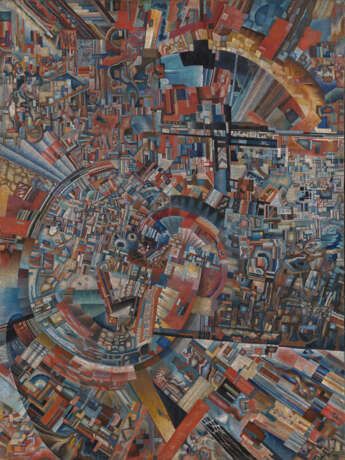ID 1396
Lot 26 | LUPPIAN, VLADIMIR (1892-1983)
Valeur estimée
£ 200 000
Revolution as a Stage of Evolution, signed and dated 1924–1961.
Oil on canvas, 71 by 53.5 cm.
200,000-300,000 GBP
Provenance: Collection of Art-Divage Gallery, Moscow.
Acquired from the above by the present owner.
Private collection, UK.
Exhibited: The Filonovites: From the Masters of Analytical Art to the Post-Avantgarde, Art-Divage Gallery, Moscow, December 2006–February 2007.
Literature: Panorama iskusstv, Moscow, Sovetskii khudozhnik, 1990, p. 115, illustrated.
Exhibition catalogue, The Filonovites: From the Masters of Analytical Art to the Post-Avantgarde, Moscow, Skorpion, 2006, illustrated on the cover; p. 88, illustrated; p. 127, listed.
Revolution as a Stage of Evolution is Vladimir Luppian’s main Filonovite work, which it took him over thirty years to finish. Luppian’s loyalty to his teacher was not merely personal: his wife, Maria, an actress, sewed the costumes designed by the Collective of Masters of Analytical Art for Igor Terentiev’s famous production of Nikolai Gogol’s The Government Inspector at the Experimental Theatre in the House of Printing in Leningrad; while his daughter Muza also studied under Filonov.
Luppian’s own art was governed by the principle of “madeness”. The entire voluminous work was constructed from point to point. The micro and macro levels were constantly in mutual contact, with the aid of a type of capillary system. Although the artist ostensibly followed his teacher’s “formulae” closely, his works were by no means clones of Filonov’s creations. Filonov demanded “biological madeness.” While Luppian’s works can also be compared to organisms, they are more like “mechanical organisms” or, to be more exact, “metaphorical-mechanical organisms” – the “steel machines that have no soul” as described in Alexander Blok’s poem, The Scythians (1918).
Among all of Filonov’s students it was Luppian who most valued the concept of “technology”, as evidenced by his works, such as Quanta of Light and Energy as Matter. Luppian is clearly evaluating the experience of Kliment Redko and his electro-organism. He appears to be attempting to visualise the very energy of life: the metaphors of batteries, energisers, energy fields and discharges can be deciphered in the haze of dots caught up in a centripetal movement and the “power lines.” Imagining Filonov’s movement as a battlefront, Luppian would seem to head the “technological” flank (emulating such benchmark works by Filonov as GOELRO and The Mechanic).
Dr Alexander Borovsky, Head of Contemporary Russian Art at the State Russian Museum
| Adresse de l'enchère |
MacDougall Arts Ltd. 33 St James’s Square SW1Y 4JS London Royaume-Uni | ||||||||||||||
|---|---|---|---|---|---|---|---|---|---|---|---|---|---|---|---|
| Aperçu |
| ||||||||||||||
| Téléphone | +44 20 7389 8160 | ||||||||||||||
| Téléphone | +7 495 799 4683 | ||||||||||||||
| Fax | +44 (0) 20 7389 8170 | ||||||||||||||
| Commission | 27 % | ||||||||||||||
| Conditions d'utilisation | Conditions d'utilisation | ||||||||||||||
| Heures d'ouverture | Heures d'ouverture
|




